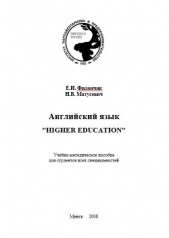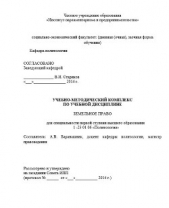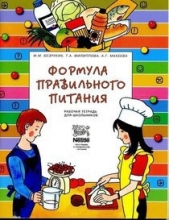Английский язык. Higher education

Английский язык. Higher education читать книгу онлайн
Настоящее учебно-методическое пособие предназначено для студентов социально-экономического факультета ИПП как дневной, так и заочной формы обучения, изучающих социокультурный и/или лингвострановедческий курс английского языка. Рассчитано на 72 часа аудиторной работы для студентов гуманитарных и экономических специальностей на дневной форме обучения, 30 часов и 10 часов соответственно для студентов гуманитарных и экономических специальностей на заочной форме обучения, что отображено в разделе 1 пособия.
Характер данного пособия определяется целью, которая ставится при обучении иностранным языкам в неязыковых вузах - углубление иноязычных знаний и формирование коммуникативных навыков и умений студента. Данное пособие призвано обеспечить студентов тематически упорядоченным языковым материалом, который может служить основой для развития и закрепления навыков, необходимых для глубокого понимания содержания иноязычного текста, анализа прочитанного, подготовки к монологической и диалогической речи, а также для письменных сообщений.
Внимание! Книга может содержать контент только для совершеннолетних. Для несовершеннолетних чтение данного контента СТРОГО ЗАПРЕЩЕНО! Если в книге присутствует наличие пропаганды ЛГБТ и другого, запрещенного контента - просьба написать на почту [email protected] для удаления материала
PART IV
DIRECTIONS:
Complete the following sentences:
The Institute was founded… .
It has managed to become a reliable and competent partner … .
The Institute has been developing its business relations … .
The Law department trains specialists … .
Training in the Institute is performed … .
The Institute enjoys good premises … .
The academic year begins … .
Each term ends… .
Attendance at lectures is …. .
PART V
DIRECTIONS:
Translate into English:
Институт был основан в 1992 году.
Институт наладил и развивает деловые отношения с образовательными и общественными организациями во многих странах мира. В институте 3 факультета: правоведения, социального и экономического менеджмента и международных экономических отношений и международного коммерческого права.
Обучение проводят высококвалифицированные профессора, доценты и преподаватели.
Институт имеет хорошее помещение с хорошо оснащенными компьютерными классами, лабораториями, лекционными залами, столовой, библиотекой и общежитием.
Учебный год состоит из двух семестров: осеннего и весеннего. .;-..
В конце каждого семестра проводятся экзамены..
Посещение лекций обязательно.
Рабочий день студентов начинается в 08.20 утра.
Все студенты изучают иностранные языки: английский, немецкий,
французский и испанский.
PART VI
DIRECTIONS:
Answer the questions:
When was the Institute founded?
What countries has the Institute established business relations with? How many departments are there in the Institute? Who does the Institute train?
Does the Institute collaborate with leading experts of Belarus? What
does it collaborate in?
What can you say about the premises of the Institute?
How many terms are there in the academic year?
In what way is the progress of the students tested?
Is the attendance of lectures compulsory?
When do the classes begin?
ACTIVITY I
SUPPLEMENTARY READING:
DIRECTIONS:
Read the text and translate it into Russian.
Text 3 The Belarus State Economic University
The Belarus State Economic University (BSEU) was founded 70 years ago in 1933. This is one of the largest universities in our country. It trains specialists in the field of economics, management and law. The graduates of the university work in all the sectors of the national economy both in the country and abroad. The university has a developed infrastructure, which provides training and research within eight schools: School of Management; School of Accounting and Economics; School of Finance and Banking; School of International Economic Relations; School of Commerce Economics and Management; School of Marketing; School of Law; School of Language Studies.
BSEU is a higher educational establishment conducting educational, scientific, research, cultural and other activity. It is a non profit organization financed from the republican budget. The University carries out the process of learning in the following areas of study: state and municipal administration; enterprise economics and management; finance and crediting; statistics; marketing; tourism services, hotel and restaurant catering and others.
There are two branches of this educational establishment beyond Minsk - in Bobruisk and in Pinsk. In general, BSEU has 57 departments (including 13 that are found in its branches), research laboratories, a student campus, and a retail trade center.
The Belarus State Economic University has a Research Center, an International Relations Division, and a Publishing Center. Its library is one of the best supplied and equipped in the country.
The university is proud of its technical equipment. It has about 40 computer classrooms, training bookkeeping centers, as well as automated PC-based training offices for specialists in management, finance, banking, and commerce. Lecture halls have slide projectors and other required technical equipment. Classes are fully equipped for language study. Satellite TV, Internet and local computing network are widely used in the teaching process.
The student's body of the Belarus State Economic University accounts for 25,000 students, with 1,200 faculty members teaching them, of whom 47 percent have advanced degrees and titles.
The training of students is done on a multi-level basis. The degrees pursued are those of bachelors, specialists and masters. The graduates can also continue their education in a post-graduate school called aspirantura (full-time or part-time), where they pursue a Ph.D. degree, and in a post-doctorate school called doctorantura to pursue a post-doctorate degree (doctor habile).
In order to receive a Graduate Diploma of BSEU, a student has to pass all the examinations and preliminary exams required by curriculum, pass final-year state examinations and defend a diploma thesis (a written work resulting from original research).
The University provides the diverse array of facilities for the use of its students ranging from sports facilities and accommodation to media, learning resource and library services, careers consultancy and the Students' Union.
UNIT 5
TOPIC “MY FUTURE CAREER”
TOPICAL VOCABULARY
career п.
карьера
acquire v.
приобретать, получать, достигать
proficiency n
опытность, мастерство
determine v
определять
ability n
способность
inclination n
наклонность, склонность
prospect n
перспектива
living conditions
жизненный уровень
promotion n
продвижение (по службе)
avoid v.
избегать
unemployment n
безработица
apply v.
применять, употреблять
be disappointed
быть разочарованным
surgeon n.
хирург
courage n.
мужество
generosity n
щедрость
joint venture
совместное предприятие
enterprise n
предприятие, отрасль
knowledge n
знания
principles n
основы
necessary a
необходимый, нужный
operate a computer
работать на компьютере
accounting
бухгалтерское дело
banking
банковское дело
reliable a
надежный
valuable a
ценный
VOCABULARY EXTENSION:
Study the following words, which are often confused by students of English.
occupation — profession — job.
Occupation is the formal word for job and is used in limited contexts like form-filling.
Job is the normal word to describe what someone does for a living; it cannot always be replaced by occupation.
Profession is high-status work that requires special training and education: law and medicine are professions; lawyers and doctors are professional people.
E.g. I’m applying for a job in a bank.
This form asks for details about your age, occupation /job, etc.
After studying law I entered the legal profession.
GETTING STARTED























